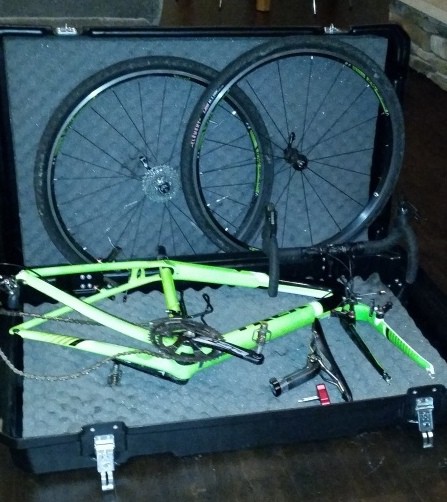While I attended the 1st ever annual “Bike Law Summit” in Austin Texas a few weeks ago, the other attorneys in various states around the country all chimed in on reaching out to local police departments and offering training to the officers. Some have already done so in their states and have had great success in helping the police better understand bicycle accidents.
I was instantly intrigued by this idea and committed to doing this in Arizona. As member of this elite group of dedicated bicycle lawyers, I am privy to many such good ideas and their national support for Arizona bicycle advocacy. In a fantastic post today by a guest blogger named Dr. Steven Goodridge of NC, our Bike Law network published his post on how to educate police about bicycling as he draws from personal experience in North Carolina. Great read – good ideas for us all. His original post is reproduced below in its entirety or can be found on our Bike Law network blog:
“In her August blog post Police & Cyclists, Ann Groninger described some of the problems faced by cyclists when police don’t understand or respect bicyclists’ legal rights. Because most police obtain no special training about bicycling, they share many of the same misconceptions and biases as the general public. So what can be done about it?
One possibility would be for the North Carolina Justice Academy to enhance the very basic bicycle information that appears in the traffic curriculum they set for Basic Law Enforcement Training (BLET) . This way, all new officers in the state would be better educated. Unfortunately, many important subjects and skill sets compete for inclusion in the dense BLET curriculum. It will be difficult to get a nuanced discussion of cycling laws and best bicycling practices included in BLET when other potentially life-or-death knowledge doesn’t make the cut.
Police officers receive in-service training continuously throughout their careers. Such training provides the opportunity for deeper coverage of special topics, and is an ideal way to introduce better bicycling information to officers. BikeWalk NC has developed an in-service training program called “Bicyclist Safety and Law Enforcement” to cover bicyclists’ legal rights and responsibilities, defensive bicycling practices, types and causes of common crashes, and effective enforcement activities to promote bicyclist safety. This training program was originally developed as an online Moodle course in cooperation with the Raleigh Police Department and the Raleigh Bicycle and Pedestrian Advisory Commission. All sworn officers in the Raleigh Police Department were required to complete the course on RPDnet as of May 2011. Since then, BikeWalk NC has delivered customized versions of the course to the Town of Cary PD and NC State University PD, and has made a generic state-wide version available on its web site.
The Bicyclist Safety and Law Enforcement program was developed to provide all officers with essential background information about traffic bicycling. The primary goals include:
• Empathizing police officers to bicyclists’ concerns;
• Spreading awareness of bicyclists’ roadway rights as fully entitled drivers of vehicles under the law;
• Familiarizing police officers with defensive, legal bicycling practices such as lane control;
• Associating common crash types with the moving violations that cause them;
• Prioritizing violations for enforcement based on risk (for motorists: drunk driving, failure to yield, unsafe passing, and failure to reduce speed; for bicyclists: wrong way cycling, unlighted night cycling, and failure to yield).
Feedback from police has been that the program increased awareness of bicycling issues and improved the handling of car-bike collision investigations.
Local police departments can incorporate this program into their in-service training in a number of ways, including setting it up as an online course, viewing the narrated video, or teaching it in-person based on the lesson plan, which follows the instructional design format used by the NC Justice Academy. Different departments have different needs for instruction format, which is why BikeWalk NC provides it in multiple forms. The biggest challenge to getting the training into a local department is finding a local champion in the department or city government who will make it happen. As outsiders to the police department, local bicyclist advocates cannot make police prioritize bicycling education. It is essential for advocates to develop a strong relationship with local government representatives such as city council, transportation planners, and the traffic enforcement division in order to convince them that the training program is worthwhile. A local bicycle/pedestrian advisory commission is an ideal route for developing police involvement.
Some cities in NC are conducting targeted education and enforcement activities to improve pedestrian and bicyclist safety. The Watch for Me NC campaign deployed by the NCDOT Bicycle and Pedestrian Division provides police training on how to conduct targeted safety efforts such as crosswalk stings, where officers walk through crosswalks to detect drivers who fail to yield, and follow up with warnings or tickets. Although the Watch for Me campaign involves small teams of officers rather than educating the entire department, it nevertheless provides a useful way to increase local subject matter knowledge. Municipalities that wish to participate in the Watch for Me NC campaign and obtain training, materials and other assistance should apply via the process detailed on the website. Partners will be selected through a competitive application process. The application will be available January 26 and will be due March 27, 2015.
Like BikeWalk NC’s in-service training, bringing the Watch for Me NC campaign to your community requires motivated government representatives. Local advocates must network with their local police, transportation planners, and elected officials. The reality is that enforcement priorities are often political, and as they say, all politics is local.
****
Steven Goodridge, Ph.D. contributed heavily to the content and editing of Bike Law Books # 1, the Ride Guide to North Carolina Bicycle Laws. Steve is an avid utility and recreational bicyclist who lives and works in Cary, North Carolina. An advocate for bicyclists since 1999, he is currently a board member of BikeWalk NC and is a League of American Bicyclists League Certified Instructor. In his professional work as an electrical engineer, Steven develops digital audio, video and communications technologies for law enforcement and defense applications. Steven enjoys doing volunteer work with local police departments, cycling organizations and schools to promote better understanding of traffic laws, best bicycling practices, and effective enforcement techniques to support safer cycling.”











